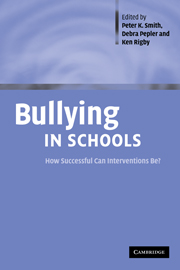Book contents
- Frontmatter
- Contents
- List of figures
- List of tables
- Notes on contributors
- Preface
- 1 Working to prevent school bullying: key issues
- 2 The Olweus Bullying Prevention Programme: design and implementation issues and a new national initiative in Norway
- 3 Is the direct approach to reducing bullying always the best?
- 4 Implementation of the Olweus Bullying Prevention programme in the Southeastern United States
- 5 Prevention of bullying in German schools: an evaluation of an anti-bullying approach
- 6 England: the Sheffield project
- 7 Making a difference in bullying: evaluation of a systemic school-based programme in Canada
- 8 Interventions against bullying in Flemish Schools: programme development and evaluation
- 9 SAVE model: an anti-bullying intervention in Spain
- 10 Australia: the Friendly Schools project
- 11 The Expect Respect project: preventing bullying and sexual harassment in US elementary schools
- 12 A follow-up survey of anti-bullying interventions in the comprehensive schools of Kempele in 1990–98
- 13 Targeting the group as a whole: the Finnish anti-bullying intervention
- 14 Ireland: the Donegal Primary Schools' anti-bullying project
- 15 Bernese programme against victimisation in kindergarten and elementary school
- 16 Looking back and looking forward: implications for making interventions work effectively
- Author index
- Subject index
- References
11 - The Expect Respect project: preventing bullying and sexual harassment in US elementary schools
Published online by Cambridge University Press: 02 December 2009
- Frontmatter
- Contents
- List of figures
- List of tables
- Notes on contributors
- Preface
- 1 Working to prevent school bullying: key issues
- 2 The Olweus Bullying Prevention Programme: design and implementation issues and a new national initiative in Norway
- 3 Is the direct approach to reducing bullying always the best?
- 4 Implementation of the Olweus Bullying Prevention programme in the Southeastern United States
- 5 Prevention of bullying in German schools: an evaluation of an anti-bullying approach
- 6 England: the Sheffield project
- 7 Making a difference in bullying: evaluation of a systemic school-based programme in Canada
- 8 Interventions against bullying in Flemish Schools: programme development and evaluation
- 9 SAVE model: an anti-bullying intervention in Spain
- 10 Australia: the Friendly Schools project
- 11 The Expect Respect project: preventing bullying and sexual harassment in US elementary schools
- 12 A follow-up survey of anti-bullying interventions in the comprehensive schools of Kempele in 1990–98
- 13 Targeting the group as a whole: the Finnish anti-bullying intervention
- 14 Ireland: the Donegal Primary Schools' anti-bullying project
- 15 Bernese programme against victimisation in kindergarten and elementary school
- 16 Looking back and looking forward: implications for making interventions work effectively
- Author index
- Subject index
- References
Summary
Impetus for the intervention, early stages of planning, and funding
The Expect Respect project was developed by SafePlace, the sole provider of comprehensive sexual and domestic violence prevention and intervention services in Austin, Texas. Since 1989, SafePlace has been providing school-based counselling and support groups for students who have experienced dating, sexual, or domestic violence, and educational programmes in schools for students, parents, and school staff. These services began in response to requests from school counsellors who were aware of young women in physically abusive dating relationships. SafePlace counsellors initiated weekly support groups at several local high schools and middle schools to help abused girls to increase their personal safety, social support, and skills for healthy relationships. Over the years, additional counselling and support-group services were added to respond to the needs of boys and girls in grades K-12 who had experienced dating, sexual, or domestic violence. In an effort to reduce the incidence of dating violence SafePlace began in 1995 to investigate strategies for promoting safe and respectful relationships among younger children, with the intent of raising their expectations and skills for respectful behaviour in future dating relationships.
Discussions with elementary school teachers and counsellors revealed that children as young as 11 years were already engaging in dating behaviours, and that frequently these relationships involved behaviours that could be described as bullying and sexual harassment, including hitting, pushing, unwanted touching, name-calling, and put-downs.
- Type
- Chapter
- Information
- Bullying in SchoolsHow Successful Can Interventions Be?, pp. 211 - 234Publisher: Cambridge University PressPrint publication year: 2004
References
- 12
- Cited by



